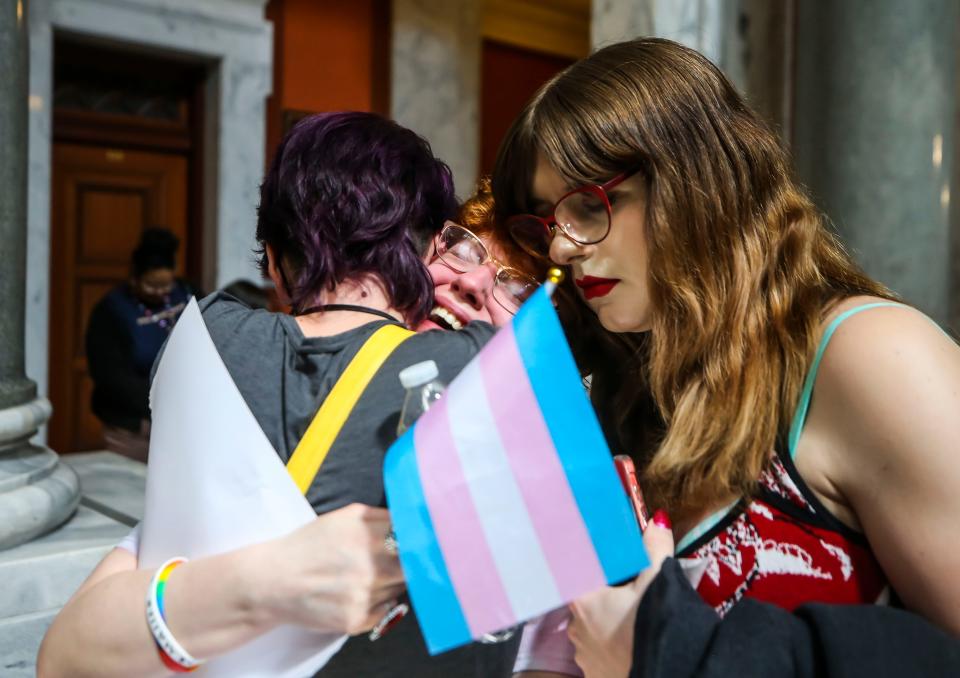Back to school in NKY: Restrooms, sex ed policies change with state anti-trans law

Over the summer, many Kentucky school boards passed policies tied to Senate Bill 150, which in part sets new rules about bathroom and locker room use for transgender kids and adds mandates for human sexuality education.
The Kentucky law enacted in March is the most anti-trans law in the nation, according to the American Civil Liberties Union. Opponents say it violates kids' civil rights and will harm transgender kids, who have higher risks of depression, thoughts of suicide and suicide attempts than kids whose gender matches their assigned sex at birth. Advocates say it protects student privacy and gives parents more control of their kids' education. Both sides expect court fights about who's right.
More: Despite emotional pleas, one of country's strictest anti-trans bills becomes law in Kentucky
To help parents and students prepare for changes that may impact their kids, The Enquirer asked officials at 15 districts across Northern Kentucky what, specifically, the law will mean for returning students.
But we don't know a lot about what will happen as kids reenter their school buildings. That's because few district officials replied to questions in emails or to a statewide Courier Journal survey that asked how schools will handle the requirements that affect things like bathroom and pronoun use and human sexuality classes.
A few offered that they will follow the law. But there is nuance to the law.

Here's what the law says and what Northern Kentucky school district officials who did respond had to say about the policies their boards were required to adopt.
Restrooms, locker rooms, pronouns and sex ed
Bathrooms: The law requires schools to prohibit students from using restrooms, locker rooms or shower rooms that are reserved for students of “a different biological sex.” Legislators meant the prohibition is for transgender kids, who are a different gender from the sex they were assigned at birth.
Pronouns: The law states that teachers are not required to use transgender kids’ pronouns, but it does not forbid them from doing so.
Human sexuality classes: There are questions about the law regarding this education. The Kentucky Department of Education says the law states that schools have a choice: They can either limit sex education to students in sixth grade and up, or they can decide not to have students study gender identity, gender expression or sexual orientation at any grade level. Kentucky Attorney General Daniel Cameron countered that interpretation, saying districts must do both: Keep the education to grades six and up, and prohibit the studies of gender and sexual orientation for every student.
The law also requires parents to be notified in advance of any sex education class so they can decide whether to pull their kids from it and have them take another class that yields the same credit.
More: Did lawmaker goof on Kentucky's anti-trans bill 'or' not? SB 150 may have loophole
More: Cameron's office: Kentucky school districts should enforce SB 150 as lawmakers intended
What we asked Northern Kentucky school district officials
The Enquirer asked several questions of the 15 districts in Northern Kentucky, including these:
Will your teachers use the pronouns their students use for themselves?
Where will your transgender students be directed to go to the bathroom?
What will your district do if a transgender child is found to use a bathroom according to their identified gender?
Does your district plan to continue teaching sexual education?

Do your district’s schools have prepared forms that will notify parents of any human sexuality education of a student (to be provided at least two weeks prior to the student's planned participation)?
The policy changes have caused a stir, with some Kentucky school districts questioning their legality. Jefferson County Board of Education approved the required policies after much discussion.
But the board said any transgender student who has been diagnosed with gender dysphoria might be entitled some accommodations, such as a particular restroom use. While being transgender is not a medical condition, gender dysphoria – which doesn't affect all trans people – is considered a disability, characterized by the American Psychiatric Association as a condition causing, “psychological distress that results from an incongruence between one’s sex assigned at birth and one’s gender identity." People with disabilities are protected under federal law.
Here's how Northern Kentucky districts responded
Southgate Independent Schools: District officials answered survey questions with a statement that it would "follow state law" but provided no specifics about questions regarding nuances in the law.
Covington Independent Schools: Board President Tom Haggard made clear he is "dismayed" with the law.
He said the school board initially delayed its vote on the policies because "I was working furiously behind the scenes with our attorneys, with NKY Pride Center on what is going to be the real life consequences of these policies.”

“It’s not a policy that Covington wants to adopt," Haggard said after the board did so July 31. "To LGBTQ students, we have your back."
Fort Thomas Independent Schools: Superintendent Brian Robinson, who did not respond specifically to questions, did indicate support for all of the district's students, offering, "The Fort Thomas Independent Schools work closely with families to ensure we meet the needs of all of our students."
Kenton County Schools: The district director of public information, Jessica Dykes, responded in an email, "The Kenton County School District will follow the law.”
Boone County Schools: District spokeswoman Barbara Brady said she'd spoken with Superintendent Matthew Turner and relayed on his behalf, "we are following the law and intend to implement any and all provisions of Senate Bill 150 where it impacts our curriculum and restroom policies.”
The Enquirer contacted school districts in Boone, Campbell and Kenton counties and both the Grant County and Williamstown districts for this story.
This article originally appeared on Cincinnati Enquirer: Back to school in NKY means sex ed, restroom changes from SB 150

